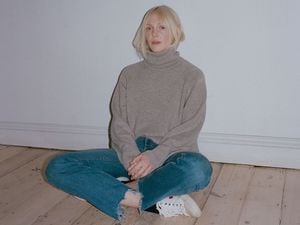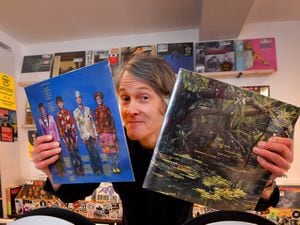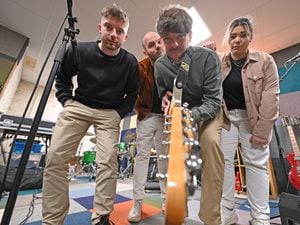Laura Marling explains how taking a musical sabbatical allowed her to produce perhaps her finest album yet
Much has changed in the life of Laura Marling since she last released an album.

But instead of looking inward, the Berkshire-bred folkie looks to the world and people around her in her latest work.
“You start in your late teens as a kind of self-obsessed narcissist,” explains Laura Marling with just a hint of wry humour.
“I think that’s the right way to be in your late teens – to believe that the world revolves around you in some way.
“And then in your mid-20s you’re like ‘Wow – I’m a very, very small fish in a massive pond of experience that everybody has shared’.”
Marling is explaining how her perception of the world – and herself – has shifted in recent years.
In February she celebrated her 30th birthday – “a non-event,” she says blithely.
But she is enjoying the ageing process – for the wisdom it brings and the proximity it gives her to her musical heroes and heroines (Joni Mitchell, for example, produced much of her great work in middle-age).
Critics have painted Marling as an old soul. Perhaps they are finally right.
Since departing Berkshire at 16 to pursue music in London, she has lived more lives than most.
Marling spent her early days in London’s awkwardly-titled nu-folk scene, singing backing vocals for Noah And The Whale, before recruiting an early iteration of Mumford And Sons as her band.
There were awards and nominations and praise from critics and fans alike, and a stint living in Los Angeles.
After her last album, 2017’s Semper Femina, Marling decided to take a musical sabbatical.
She left her record label and management, wrote for the theatre director Robert Icke, took a masters in psychoanalysis and formed a duo called Lump with Mike Lindsay from Tunng.
“I’ve always had an interest in psychoanalysis, since I was a patient of it for many years,” she divulges.
Song For Our Daughter, her seventh album, is the product of all this.
“I like getting older – I’ve enjoyed getting older so far,” she explains.
“The people I looked up to were always in their 40s and I feel like the closer I get to my 40s, the more authority I have,” she laughs.
We speak on the phone before Marling releases Song For Our Daughter with just a few days’ notice, and earlier than initially planned, as a gift to lockdown Britain.
“Usually you wait a really long time to put it out. Usually it’s at least six months, which is tortuous for me,” she chuckles.
“So this is nice – this is a nice alternative way of doing it.”
For Marling, life has not changed dramatically under lockdown.
She still has access to her studio, tucked in the basement of the north London home she shares with her boyfriend and sister.
“There’s a little bit of a battle for privacy among us all,” she quips.
She reads, listens to music, studies and hosts virtual guitar tutorials of her own songs several times a week over Instagram Live.
The only things missing, she says, are her usual walks.
Marling moved to Silver Lake in Los Angeles around 2013 to record an album, before relocating back to London a year later.
“It’s been very nice,” she said of returning to the UK.
“I did my time away from my family, established my own identity, and by my family, I mean my family and friends.
“I’ve done my time, I think America was getting ever more sinister as the years were going by.
“It’s continuing on that trajectory so I feel very lucky and grateful to be in London and away from that. It’s nice.”
As part of her sabbatical, Marling took a commission from Icke in 2017, for the feature song to his adaptation of Mary Stuart, starring Lia Williams and Juliet Stevenson at the Almeida in London.
To her friends in the acting community, she had peaked.
“He got my email address from someone and I went to meet him,” she recalls.
“I didn’t know much about him, but my theatre friends absolutely lost their s*** when they found out I was meeting him.
“Every single actor I knew was begging me to try and get them an audition.
“He had this quality that preceded my meeting him, because everybody said he was so brilliant - and he is.”
The pair worked together again on Hamlet, again at the Almeida, which starred Andrew Scott (before his debut as Fleabag’s Hot Priest).
They are now good friends and Icke lives “just down the road”.
“Listening to him talk about how he constructs a play is one of the great privileges of my life,” she muses.
Living in London, Marling swapped the solitary life of the road for what she describes as “an energetic pack”.
“You’re around people all the time, observing them and listening to what’s going on in their lives,” she says gleefully. “Whereas in previous albums, I’ve either been on the road on my own, or living in LA on my own - or whatever.
“I’ve had a very consistently solitary time in which to write, and “I think this album is rooted more in my interest in everybody’s internal passions.
“The realisation that people fall in love secretly or they have things that they grieve and mourn that were never made verbal and given an external form.
“Everyone has these huge worlds inside them and that’s been an interesting thing to contemplate, maybe given the writing a different tone.”
Before we disconnect, she delivers an excellent, and apparently effortless, metaphor for her experience of lockdown.
“I think it’s more of a breathing-in period than a breathing-out period for me. It’s more of an inhale than an exhale.”
Laura Marling’s seventh album Song For Our Daughter is out now.





